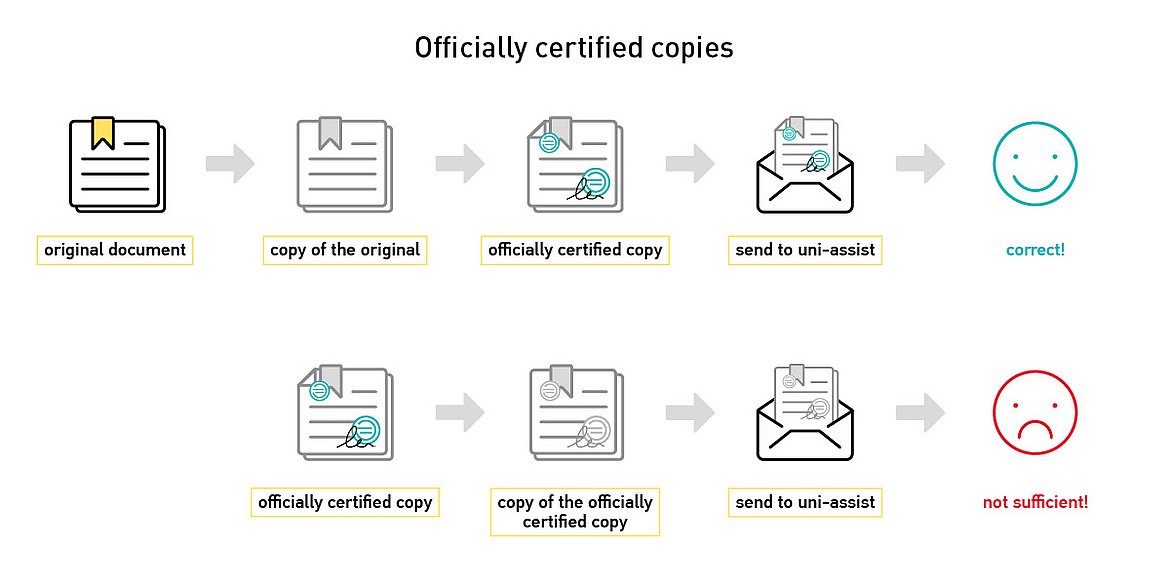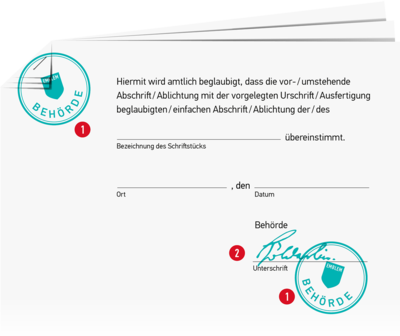Certified copies and translations
uni-assist universities have shared standards on official certification and certified translation. This section will tell you what to keep in mind.
How do copies need to be certified?
Officially certified copies must always contain the following:
- the original official stamp and
- the original signature of the certifying person
Officially certified copies consisting of multiple pages must clearly show that every page has been officially certified in the same process. This can be ensured in the following ways:
- Using the official stamp: The official stamp must be visible on all pages. In order to achieve this, the person who certifies the copy attaches the pages to each other in a staggered arrangement and then stamps them with the official stamp. This results in every page carrying a part of the official stamp. With this method, the certification declaration and signature need to be applied to only one page.
- Using a ribbon and an embossed seal: If a notary attests the copy using a ribbon and an embossed seal, the certification declaration and signature also need to be applied to only one page.
Outside of Germany, the following institutions may carry out official certifications:
- the issuing institutions, e.g. schools, universities or language schools,
- the ministry of education in your country of origin,
- German embassies and consulates,
- the department of cultural affairs of the embassy of the country in which the certificate was issued,
- public authorities and Notaries which are authorised to supply Official certifications in your country of origin.
Important: Translators are not authorised to certify documents in their original language.
In Germany, any public institution ("öffentliche Stelle") which has an official stamp ("Dienstsiegel") is authorised to certify documents. This includes:
- Town halls / Citizen centres,
- "Ortsbürgermeister" (local mayors),
- "Kreisverwaltungen" (local governments),
- Parish offices,
- courts,
- Notaries.
Important: Translators are not authorised to certify documents in their original language.
Public institutions in Germany are allowed to certify documents in a foreign language, but are under no obligation to do so. If you cannot find a public institution in Germany that will certify your documents, please contact the embassy of your country of origin or a notary.
How do I submit certified copies?
Your officially certified copies must be sent to uni-assist by post. Scans / uploads of certified documents are not sufficient. We also do not accept simple photocopies of officially certified copies.
Standards for the language of certificates
Submit your certificates in their original language, accompanied by a translation in German or English. This also applies to the overview of subjects and grades.
If your country issues your certificates (additionally) in German or English, we do not need a translation (exceptions are listed under Info country by country).
Certificates in French must be translated into German or English.
Standards for certified translations
We accept translations of certificates from the following sources:
- persons or institutions authorised to make translations under oath or admissible in court,
- a department of the issuing school or university authorised to issue such translations.
We do not accept non-certified translations from standard translation agencies.
Copies of translations also need to be certified. Translators may put their original stamp on copies of translations made by themselves. However, they may not certify documents in their original language.



